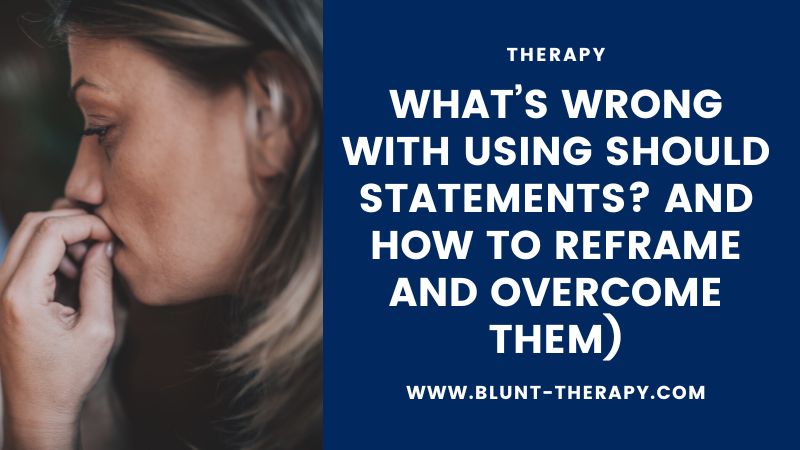Table of Contents
Affiliate link notice: As an affiliate of BetterHelp and other third-party vendors, We will receive compensation if you make a purchase using the links provided on this page. For more information, visit our disclosure page.
Last Updated on December 14, 2021 by Randy Withers, LCMHC
Are you in the market for a new therapist?
If you are new to therapy, the whole process may seem a bit overwhelming. I know it was for me when I first started my own journey of recovery.
To help you find a therapist that is right for you, I’m going to suggest a few questions to ask your new therapist before you even start seeing them. You might not have thought of these, but they are important just the same.

By doing so, it’s my hope that you will:
- Better understand what your therapist can do for you
- Establish a professional rapport with them
- Feel more comfortable about starting therapy.
Let’s get to it, shall we?

1. What Type of Therapist Are They?
Just like doctors, lawyers, engineers, and mustard, therapists come in many varieties. So, let’s first clarify what we mean by “therapist.”
Technically, the term is “psychotherapist,” but clinicians tend to use that label with caution, as it sounds a bit… clinical.
Even among psychotherapists, there are different types. They all are trained to help you, but what they can do varies by license, experience, and training. You can find hundreds of online therapists that specialize in helping people with different problems.
The following list should give you a basic idea of the differences:
- Psychiatrists (MD) are medical doctors who can prescribe medication.
Psychiatrists practice in all sorts of different places — hospitals, community agencies, and in private practice. They are trained in some form of psychotherapy, but medication management is often a defining component of their care.
Because they can prescribe medication, psychiatrists are often in high demand. If you don’t need medication, or you have a doctor who already prescribes your medications, then consider other types of therapists who are more readily available.
- Psychologists (Ph.D., PsyD, LPA) practice at both the masters and doctoral levels. One critical distinction between a psychologist and a psychiatrist is that most psychologists can’t prescribe medications.
Movies and TV shows get this wrong all the time. The character is seeing a psychologist and at the end of the session, the psychologist writes a script for Xanax and the client goes on their way. That’s not how it works in real life. Only medical professionals can do that — doctors, physician’s assistants, nurse practitioners, etc.
Psychologist’s forte is testing and evaluation. School psychologists, for example, are often involved in the creation of IEPs that are developed based on testing that the psychologist performs.
At the agency or hospital level, they write psychological evaluations based on tests that can cover dozens of different issues — IQ, ADHD, PTSD, personality disorders, level of depression or anxiety or schizophrenia, etc.
There are many different types of psychologists with many different types of specializations. Psychologists tend to see clients with pervasive mental illness, or personality disorders. Like Psychiatrists, they are also in high demand due to these skill sets.
- Marriage and Family Therapists (LMFT), as the name implies, deal with issues related to marriage and family.
If you’re looking for couples counseling, consider finding a good LMFT. Sometimes, entire families need therapy, too. They can handle that as well.
- Licensed Clinical Social Workers (LCSW) and Licensed Professional Counselors (LPC) are similar in most respects.
An LCSW has more training when it comes to the coordination of social services, and LPCs focus more on a wellness model for their clients, but in practical application, the two are similar.
Many LPCs and LCSWs tend to specialize — some work with small children and some maybe exclusively work with adults, or teenagers, or couples. Mood Disorders, PTSD, depression and anxiety, and addictions are all examples of specializations.
Has all of this left you confused?
Fortunately, this information is all readily available as part of a therapist’s Informed Consent, which you will often get before you even sit down for your first session. Depending on where you go, you will often get a batch of paperwork to read and fill out.
It’s a good idea to read this information. It should tell you exactly what type of therapist they are, what they specialize in, and what type of clients they see. If not, here’s a suggestion:
Ask them!
You have a right to know this information, and it’s a great question to ask your new therapist before you begin. This may seem obvious, but you’d be surprised how many clients are afraid to ask basic questions that they have a right to know.
Insider Tip: If a therapist has an office assistant, like someone who schedules the appointment, they may not be the best person to ask. When in doubt, ask the therapist directly. They’ll be pleased you did.

2. Are They Required To Diagnose You?
Unless you are paying out-of-pocket, meaning that the insurance company is not involved, you will probably leave your therapist’s office with a mental health diagnosis. The same basic thing happens when you go to your doctor.
Doctors have a code for everything. Got the flu? There’s a code for that. Carpal tunnel? There’s a code for that, too. It’s how doctors get paid. They submit these codes to your insurance company, and they get reimbursed for their services.
That’s not really that big a deal, though. Or is it?
If you use insurance, know that most cases, a therapist must submit a diagnostic code to get paid by the insurance company. We use the DSM 5, which is an acronym for the Diagnostic and Statistical Manual of Mental Disorders, Version 5.
The DSM is a catalog of every mental health disorder known to man. And if your therapist wants to get paid, they will need to submit a diagnosis.
Here are a few examples:
- 296.33 Major Depressive Disorder, Severe, Recurrent
- 307.51 Bulimia Nervosa
- 302.72 Erectile Disorder
- 292.0 Caffeine Withdrawal
- 300.02 Generalized Anxiety Disorder
- 309.0 Adjustment Disorder with Depressed Mood
As you can see, they get specific. Who knew caffeine withdrawal was a thing? At any rate, many therapists loathe having to give a diagnosis after only one session, but this is the system we work in.
If you’re having a bad day and you just need to vent to somebody, there is no corresponding code. Likely, it would be coded as an “Adjustment Disorder.”
Say you’ve just moved to a new town and you’re feeling lonely and your sleep cycle has been disrupted because you’re in a new time zone. That’s an example of an adjustment disorder. Relative to some other conditions, it’s mild.
However, other diagnoses can have long-term implications, and not just on your mental health. For example, some mental health conditions affect life insurance rates. Others will disqualify you from certain types of jobs.
But that information is confidential, you say? Yes. Yes, it is. Except, no — it’s not.
You have a right to know that your insurance company will be notified of your diagnosis unless you are private pay, which means that you are paying 100% of the fees associated with therapy.
Insider Tip: If you have concerns about a diagnosis becoming part of your permanent medical record, this is another one of those excellent questions to ask your new therapist. Inquire about private pay options if this is a concern.

3. What About Confidentiality?
Trust is a critical part of the therapeutic relationship. If I am your therapist and you are my client, you have to know that I’m not going to be gossiping about your personal life to the cashier at Walmart, or discussing your history with anyone with whom you have not specifically asked me to do so.
What is said in therapy stays in therapy. That’s just a given. Or is it?
You have a right to know that there are limits to confidentiality. This is something that your therapist should discuss with you, but often this information is part of that packet you get when you first make the appointment. Many people sign and initial without fully reading the documentation, and this could lead to a problem.
Clients need to have a frank discussion with their therapist about confidentiality, and this really should be an ongoing conversation. As therapy continues, new issues are bound to surface, and a client needs to know what a therapist can keep quiet about and what he or she cannot. Here are some points to consider:
- Confidentiality is an ethical concept, not a legal one. The term “privileged” denotes something that is protected by law. This is an important distinction.
- There are times when the law requires therapists to break confidentiality.
- A therapist can be compelled by a judge to testify in court. This happens a lot during child custody hearings, especially when one or both spouses have seen a therapist.
- If you are a minor, confidentiality is essentially up to your parents. Clients under the age of eighteen should talk with their therapist about what can stay between them, and what goes back to mom and dad.
Suicidal intent, homicidal intent, suspected abuse of children or the elderly, and imminent threat to the client or someone else are all potential reasons why a therapist could break confidentiality. This list is not all-inclusive. The nature of confidentiality is one of the many perfectly reasonable questions to ask your new therapist.
All therapists must observe an ethical mandate called “Duty to Warn.” In some states this is a legal requirement, but not in all. “Duty to Warn” means that if the therapist has reason to believe that you plan on hurting someone (say, for example, an ex-girlfriend) — they are obligated to reach out to that person and warn them specifically. They will also alert the police.
Insider Tip: Some therapists are good about going over this stuff; some are not. Advocate for yourself! Bring questions to ask your new therapist. You have that right.

4. What Is Their Theoretical Orientation?
If you’ve ever seen therapy on TV or in a movie, it’s usually not an accurate depiction, namely because real therapy does not make for good TV. Often, you see the client lying on a couch and talking about his or her dreams.
What you are seeing is a Hollywood “interpretation” of Freudian Psychoanalysis, which is an example of theoretical orientation. Freud believed that dreams offered insight into our unconscious mind, that the past dictated the future, that procreation was a driving force in our lives. He believed in other stuff too, but you get the picture.
These ideas, or theories, guided, or oriented, his belief system about therapy. Thus, the term “theoretical orientation” can be loosely defined as a set of ideas to which a therapist subscribes about how to affect positive change through therapy.
More than 100 years after Freud literally wrote the book on Psychoanalysis, there are a few dozen different theoretical orientations that therapists use in various ways. Too many to list here, but suffice to say, it’s a good idea that you know which one(s) your therapist uses.
If you’re curious to know if there is one that tends to be more popular with therapists, there is. It’s called CBT, or Cognitive-Behavioral Therapy. Basically, the theory says that our thinking dictates the way we feel. If our thinking is screwed up, it follows that our feelings will be, too.
CBT is likely what your therapist uses. But as I said, there are a few dozen different theories in current application today.
Theoretical orientation is important because it can have a direct impact on the following:
- The therapist’s belief about the relationship between client and counselor
- The therapist’s belief about the nature of change (which is why you are there in the first place, probably).
- Interventions that they use to bring about said change.
Insider Tip: These days, many therapists like to pull from several different theories, the idea being that humans are too complex for any one theory to cover. This is known as eclecticism. A therapist should be more than willing to discuss this with you. Many clients never ask, so you may find that they are pleasantly surprised to get the question!

5. What About Their Experience?
There are two types of experience — Personal and Professional. Mental Health is one of those fields where your personal experience can be either a great asset or a great detriment, depending on how you use it.
Professional experience, on the other hand, deals with education, training, supervision, and research. Anyone can take a course on schizophrenia, but that doesn’t mean they know what it’s like to be schizophrenic.
But does a therapist need to have personally experienced every condition they treat? Is that even realistic?
A therapist’s most important tool is empathy, which is the ability to walk in someone else’s shoes without being that person. Empathy may very well be the most important tool in a counselor’s toolbox. It would be a lot to ask a therapist to have personal experience with every single mental health issue known to man. That would drive them insane!
Personal experience can be an extremely useful tool. It also has drawbacks. Therapists are human. They are subject to the same biases, cultural affiliations, and dogmatic beliefs as anyone else. They are, however, trained to set those things aside. But they are only human.
Professional experience, on the other hand, should be readily available to you. Again, I return to Informed Consent. In this packet of information, therapists usually list their education, certifications, and areas of specialization.
At this point, it is important to note that there are many excellent therapists who do not have specific certifications in areas in which they excel. I know one doctorate level counselor who is an outstanding play therapist, but he holds no official certification.
That said, a therapist usually lists basic information about the type of person he or she sees, and for what. An example: “Dr. Awesome works with teenagers and adults in individual and group settings and specializes in depression, anxiety, anger management, and conflict resolution.”
When shopping for a good therapist, please note that there are certain disorders that require specialized training. This is not an exhaustive list, but may include the following:
- Eating Disorders
- Personality Disorders like Borderline Personality Disorder
- Schizophrenia
- Addictions
- Post-Traumatic Stress Disorder
- Psychotic Disorders
Insider tip: A therapist’s qualifications and experience are only part of the equation. Personality, culture, gender, ethnicity, age — these are all things that play a role in any relationship. Ask them if they have experience with your issues. If they don’t, ask if they can refer you to someone who does.

Final Thoughts
A good therapist can be the difference between profound mental anguish and peace of mind. It takes work, but you can get there.
Before you schedule your first appointment, take the time to learn about your therapist and what he or she can — and cannot — do for you. Remember: a well-informed client is an empowered client.
If you aren’t comfortable seeing a therapist face-to-face, you should consider seeing a counselor online.
I like to refer people to BetterHelp, which I have used myself. It’s terrific and well worth the money. You get your own therapist with the option to speak to them via chat, phone, or video. I wrote a review about BetterHelp that might help you out.
Therapy is effective for 85% of all people who participate in it, so what are you waiting for?
Suggested Reading:
- Finding The Right Therapist For Complex Post-Traumatic Stress Disorder
- Is Online Therapy Right For You?
- Online Mental Health Products and Services
- Psychiatrists Online: Reasons To Choose An Online Psychiatrist
- Or, take this Depression Quiz











Thank you for this well written and informed article.
Thank you for your support! If you have any questions, feel free to reach out.
Your website has outstanding material. I bookmarked the website
I like how you mentioned that confidentiality is an important thing to consider especially when it comes to looking for a counselor who is sufficiently equipped to handle mental health issues. There are going to be times when the doctor/patient confidentiality clause would end up being broken and several things that you’d talked about end up making their way back to your family members, and as a person, you wouldn’t be wanting that to happen. While I have no experience when it comes to looking for a therapist, it’s important to know that seeking out the correct person who can understand what exact kind of mental barricades you’re going through.
Thank you very much for your comment. I certainly agree with what you are saying.
Hello, after reading this amazing piece of writing i am too happy to share my experience here with friends.
Thanks, this was quite informative
Thanks for the great article!
I didn’t know that there was more than one type of the therapist. I always thought that one kind of therapist would cover everything. That’s good to know that you should have a psychiatrist if you need some medication.
I like that you make the distinction between psychiatrists and psychologists. My son is having school troubles and we have decided to put him into counseling. We want to know which type of treatment to get him into, so I will keep this in mind moving forward.
I wanted to thank you for explaining some things you should ask your therapist. It’s nice to know that there are some disorders that need specialized training. If you already know what disorder you have, maybe it could be good to see if there is a therapist that specializes in that condition.
I agree, and thank you very much for your feedback!
Thank you very much for the comment. Best of luck to you and your son.
It’s good that you mention on here about the importance of confidentiality when you plan on going therapy. Recently, I have been dealing with so much stress. I have been overthinking about my relationship who went sinking just weeks ago. I can’t seem to cope up with it easily. And I feel miserable at times. I want to seek help to a professional who I can easily build trust with, and who I can comfortably share my downsides. I want to be sure that he/she is not going to blab about my personal life and that he/she can totally help me get out of my recent breakdowns.
thanks for the information
I really appreciate your tips to ask your therapist. I’m thinking of seeing a Christian therapist. It’d be nice to receive both mental and spiritual guidance.
I like how you explained that a psychiatrist has studied psychotherapy much like other therapists but they can prescribe medication to their patients, unlike their counterparts. People that have serious mental health issues and are in need of taking medication in order to overcome obviously need to talk with a psychiatrist as they are trained to help with these specific needs. Thanks for clearing things up on the differences between a psychiatrist and all the other mental health careers.
Thanks for your feedback!
Great article. Thanks for sharing
I like how you mentioned finding out about their theoretical orientation and how to affect positive change. Since the pandemic started, I have felt my well-being and overall mental health start to slowly decline and now I feel just empty. I’ll have to find a therapist that can help me with this depression so it won’t affect my work or future.
I don’t know if the average person even thinks about a theoretical orientation, but I do think it’s a good idea for a client and a therapist to talk about it. The pandemic has been tough on all of us, and studies show a drastic increase in substance abuse, depression, and anxiety issues. Best to seek professional help if that describes you.
This is really important topic, thanks! My best friend has anxiety for the last seven months. He cannot cope with an accidental anxiety. I also noticed that it is difficult for him to fall asleep. I am worried about him and offered to select a therapist for him. Thanks for good tips!
Great guide to choosing a therapist, thank you, you helped me a lot!
Good article with some good points. One misconception, however, is that a judge can compel a therapist to testify in court. All judges acknowledge the “privileged” communication between a client and therapist – which is why a judge CANNOT compel a therapist to testify unless the client has signed a consent to release information.
Thank you for your comment, but this isn’t entirely accurate. I have been compelled by a judge to testify. I assure you, they have the power to do this in certain situations, especially where children are involved. Thank you very much for reading!